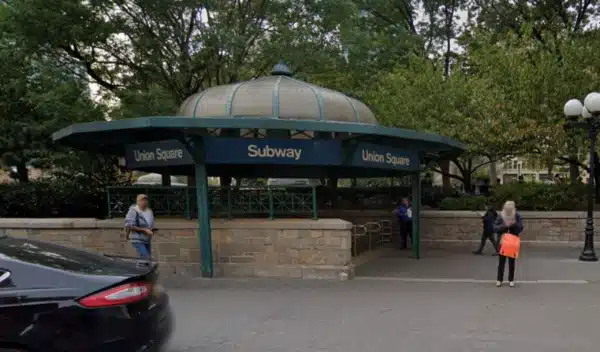
According to the New York Post, a homeless man has been charged in the fatal stabbing of a passenger aboard a Manhattan subway early Saturday morning. According to the New York Police Department (NYPD), Claude White, 33, was arrested on Monday, June 19, 2023, at approximately 5:15 p.m. and has been charged with murder in the death of a 32-year-old Bronx resident.
The tragic incident unfolded on a southbound 4 train that was pulling into the 14th Street/Union Square station around 4 a.m. Saturday. Police reports indicate that a dispute between White and the victim escalated, leading to White allegedly attacking the victim with a knife. The victim, who had previously survived a hate-fueled stabbing in the Bronx last year, was found unconscious on the train with multiple stab wounds.
Authorities revealed that Silver managed to cry out to a conductor that he had been stabbed before losing consciousness. Despite the efforts of emergency responders, the victim was pronounced dead at Bellevue Hospital.
In addition to the murder charge, White has also been charged with criminal possession of a weapon. This is not the first time the homeless man has found himself on the wrong side of the law. Earlier this month, White was charged in a Manhattan bank robbery, where he allegedly passed a note to a worker demanding money. Law enforcement sources have disclosed that White has had six previous arrests prior to Monday's incident.
The NYPD continues to investigate the circumstances surrounding the fatal stabbing, as they work to provide answers and justice for the victim's family. The incident serves as a grim reminder of the challenges faced by both the homeless population and the need for increased security measures on public transportation.

To shed light on the potential legal options available to the grieving family of victims killed on public transit, we reached out to renowned New York-based violent crime attorney, Laurence Banville. In an exclusive interview, Banville discussed the potential avenues for seeking justice in a civil case following a fatal stabbing incident on public transit, such as the subway.
Darla Medina: Mr. Banville, thank you for joining us today. In a case like this, where a loved one has tragically lost their life due to a violent crime on public transportation, what legal recourse is available for the surviving family?
Laurence Banville: Thank you for having me, Darla. In situations like these, the surviving family members have the option to pursue a civil case against the responsible parties. While criminal charges address the actions of the perpetrator, a civil lawsuit aims to hold others accountable for their potential negligence or failure to provide adequate security measures.
Darla Medina: Could you explain who these "responsible parties" might be in the context of a fatal stabbing on public transit?
Laurence Banville: Certainly, Darla. In cases involving violent crimes on public transit, potential defendants could include the transit authority, operators, security personnel, or even the municipality responsible for maintaining safety within the transportation system. The key factor is whether these entities took reasonable steps to ensure the safety of their passengers and if any negligence or inadequate security measures contributed to the incident.
Darla Medina: What kind of damages can the family seek in a civil case?
Laurence Banville: In a civil case, the surviving family members can seek compensatory damages, which may include medical expenses, funeral costs, loss of future earnings, and emotional pain and suffering. Additionally, punitive damages may be awarded in cases where the defendant's actions were particularly egregious or demonstrated a willful disregard for public safety.
Darla Medina: Are there any legal challenges specific to cases involving public transit crimes?
Laurence Banville: Public transit cases can present unique challenges, as different jurisdictions may have varying laws and standards of care. Proving negligence or inadequate security measures can require substantial evidence, including records of prior incidents, safety protocols, and expert testimonies. It is crucial for the family to work with an experienced attorney who understands the intricacies of these cases and can navigate the legal landscape effectively.
Darla Medina: Is there any advice you would give to the surviving family during this difficult time?
Laurence Banville: First and foremost, my condolences go out to the family of these tragic events. It is essential for them to focus on healing and supporting one another during this devastating period. When it comes to legal matters, I urge them to consult with an attorney who specializes in violent crime cases and has a proven track record in handling civil cases related to public transit incidents. They can help guide the family through the legal process, provide personalized advice, and fight for the justice and compensation they deserve.
Darla Medina: Thank you, Mr. Banville, for sharing your insights on this matter and providing guidance to the surviving family during this challenging time.
Laurence Banville: It was my pleasure, Darla. I hope that by shedding light on the legal options available, we can assist the family in their pursuit of justice and help prevent future incidents of this nature.
 info@legalherald.com
info@legalherald.com